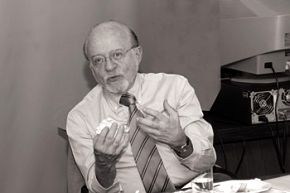
EDUARDO CESARGoldman: “Rethinking the vision of research and innovation” EDUARDO CESAR
Governor José Serra rebaptized the Secretariat for Science, Technology and Economic Development with the name of Secretariat for Development and conferred new duties on it. The organ has today “a differentiated focus”, explained the vice-governor Alberto Goldman, who in addition occupies the position of secretary. It keeps the objective of attracting investments and of expanding production and employment in the state, but it also takes on “the internal coordination function inside the government itself” previously attributed to the Secretariat for Planning “and of interfacing with the productive sector”, stated the vice-governor at a meeting with FAPESP’s Board of Trustees, on February 14.
This change in the secretariat’s strategy of work, according to Goldman, calls for a clear definition of the role of the connected institutions and the weight that science and technology will have in the state’s development plan. “This role is predefined. We have to rethink the vision that the secretariat has of research and innovation”, Goldman says. “We need to evaluate the necessary institutional points of reference”, added Carlos Américo Pacheco, the deputy secretary. Goldman and Pacheco reaffirmed the value of FAPESP, the excellence of the Foundation, and the importance of the support for research in São Paulo. “We need FAPESP to discuss this. We want to work in an integrated manner”, the vice-governor emphasized.
The government’s new strategies for development now include, for example, the idea of creating a development agency for innovation. “The plans of the Secretariat for Development include an institutional reform that updates and reinforces the instruments available for the development of São Paulo. For example, the idea of creating a state development agency, along the lines of the financial institutions that exist in other states. At the same time, we are thinking of creating an innovation agency to act in a complementary way to FAPESP. The support for research done by FAPESP has been exceptional. We need a technical corps prepared for the formulation of industrial and technological policy and of new instruments, that may potentialize the opportunity of development associated with the existing capacity for research in São Paulo”, the vice-governor explained.
The proposal to create a development agency is being evaluated by the Secretariat for Finance, he disclosed. He recalled that, at the end of the term of office of Cláudio Lembo, the government of São Paulo thought of creating a subsidiary of Nossa Caixa to operate along similar lines. “There were divergences, however, in relation to the project, and now we are studying the best route.”
Carlos Vogt, FAPESP’s president, remembered that 15 years ago the government of the state also made plans to create an agency to support technology. “The community mobilized itself and this line of financing was incorporated into FAPESP’s mission”, Vogt said. Today, 16% of the Foundation’s R$ 560 million budget is set aside for innovation programs in companies.
Two-way support
“FAPESP may benefit from the greater linkage with the secretariat and from the support offered by the vice-governor”, said Carlos Henrique de Brito Cruz, the Foundation’s scientific director, amending this to say that this assistance may be two-way. One example of this is the Ethanol Research Program, which FAPESP should launch in the next few months and for which partnership with international companies and organization is sought. “Another example is the Climate Change Program, in which international partnerships can be very interesting.”
Brito also observed that FAPESP could, in certain research support programs, have an activity closer to that of a “venture capital investor, bringing benefits and revenues to the Foundation. It so happens that the resources offered by FAPESP as support are not reimbursable. If the company grows with the financing offered, the Foundation cannot have a participation. The new version of the State Law on Innovation could consider this possibility of generating extra-budgetary revenues for the Foundation”, the scientific director suggested. He also requested the support of the government of the state to turn around the picture of reducing federal resources for the financing of São Paulo research. “A few years ago it was 60% and from FAPESP it was 40%. The picture now is reversed”, Brito observed. Goldman undertook to collaborate.
Republish